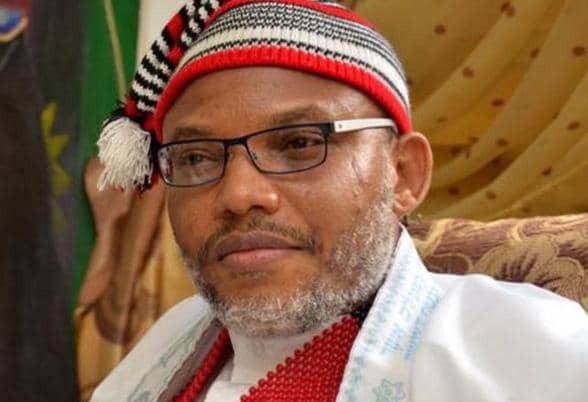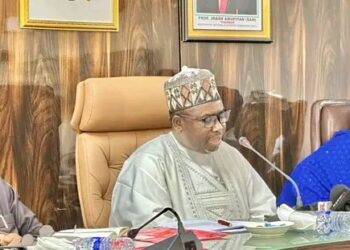An Abuja-based lawyer, Christopher Chidera has accused the Kenyan government of complicity in the Federal Government of Nigeria’s abduction and rendition of Biafra agitator, Nnamdi Kanu in 2021.
The human rights activist alleged that the Kenyan government failed in its duty to protect Kanu in the unlawful abduction and torture of the leader of the proscribed Indigenous People of Biafra, IPOB.
In a statement he made available to newsmen in Abuja on Monday, the lawyer alleged that Kenya acted in disregard for her Constitution, the Extradition Act and international treaty obligations under the International Covenant on Civil and Political Rights (ICCPR), the Mutual Assistance Within the Commonwealth Act, and the London Scheme on Extradition within the Commonwealth.
The statement is entitled ‘How the Government of Kenya Failed In Their Duty to Protect Nnamdi Kanu’.
According to the lawyer, the incident not only jeopardized Kanu’s rights but also damaged Kenya’s reputation as a rule-of-law state within the Commonwealth and global community.
Parts of the statement read, “The case of Nnamdi Kanu, leader of the Indigenous People of Biafra (IPOB), highlights significant concerns regarding the Kenyan government’s alleged involvement in his abduction, torture, and illegal rendition to Nigeria in June 2021.
“An outline of the role played by the Kenyan government showed its apparent disregard for the Constitution of Kenya, the Kenyan Extradition Act, and international treaty obligations under the International Covenant on Civil and Political Rights (ICCPR), the Mutual Assistance Within the Commonwealth Act, and the London Scheme on Extradition within the Commonwealth.
“Nnamdi Kanu, a dual citizen of both United Kingdom (UK) and Nigeria who entered Kenya on a UK passport, was abducted on June 19, 2021, at Jomo Kenyatta International Airport in Nairobi while picking up a friend.
“He was seized by armed individuals, believed to be Kenyan and Nigerian security officials, without an enforceable warrant or judicial order.
“The Constitution of Kenya (2010), under Article 29, guarantees freedom and security of the person, prohibiting arbitrary detention, torture, or inhuman treatment. Kanu’s abduction without legal justification or presentation before a court contravenes these protections.
“The Kenyan Extradition (Commonwealth Countries) Act of 1968 mandates that extradition requests be formally processed, with the individual given an opportunity to contest the transfer in court. No such process was followed, as Kenya has denied initiating extradition proceedings, suggesting an extrajudicial operation.
“Kanu was detained for eight days in a secret location within the perimeter of the Jomo Kenyatta International Airport in Nairobi, because he could hear the take-off and landing noise of aircrafts.
“He was chained to the floor, beaten, and subjected to degrading treatment, including being denied access to sanitation facilities, denial of access to his medications and tortured to the point of unconsciousness.
“Article 25 of the Kenyan Constitution explicitly prohibits torture and cruel, inhuman, or degrading treatment, rights that are non-derogable. If Kenyan officials participated in or acquiesced to such acts, this constitutes a direct violation.
“Kenya, as a signatory to the ICCPR, is bound by Article 7, which prohibits torture and cruel, inhuman, or degrading treatment. The actions also breach Article 9, which protects against arbitrary arrest and detention, as no legal basis for Kanu’s detention was established.
“On June 27, 2021, Kanu was forcibly handed over to Nigerian officials at the airport and flown to Abuja on a private jet, bypassing Kenyan immigration protocols and legal extradition processes.
“This act on its own is illegal under Kenyan municipal laws.Section 6(3) of the Kenyan Extradition Act requires that extradition comply with due process, including judicial oversight and adherence to the “Doctrine of Specialty” (limiting prosecution to offenses specified in the extradition request). No extradition request from Nigeria was processed, and Kanu’s transfer lacked judicial sanction, rendering it illegal.
“The London Scheme for Extradition within the Commonwealth, which governs extradition between Commonwealth states like United Kingdom, Kenya and Nigeria, mandates formal requests, judicial hearings, and respect for the political offense exception (Article 12). Kanu’s advocacy for Biafran secession could qualify as a political offense, potentially barring extradition. Kenya’s failure to adhere to this framework suggests a deliberate circumvention.
“This act facilitates legal cooperation amongst Commonwealth countries (UK, Kenya and Nigeria) and does not authorize extrajudicial transfers. Kenya’s actions appear to contravene its obligations to ensure mutual assistance aligns with domestic and international law.
“The Kenyan government, through its High Commissioner to Nigeria and other officials, has denied any role in Kanu’s arrest and rendition, claiming no records exist of his detention or extradition. This contradicts Kanu’s detailed account and evidence of his presence in Kenya (e.g., passport stamps). Constitutional Duty: Article 238(2) of the Kenyan Constitution subjects national security actions to the rule of law and human rights.
“The government’s apparent acquiescence to or participation in an illegal rendition undermines this principle.
“Beyond Articles 7 and 9, Kenya’s actions may violate Article 13, which protects against arbitrary expulsion of aliens lawfully present in a state. Kanu entered Kenya legally on a British passport, yet was expelled without due process.
“Kenya is a party to the 1984 Convention Against Torture, which prohibits transferring individuals to states where they face a real risk of torture. Kanu’s prior treatment in Nigerian detention (2015-2017) and subsequent reports of mistreatment post-rendition suggest Kenya ignored this obligation.
“The Mutual Assistance Within the Commonwealth Act and London Scheme emphasize cooperation within the bounds of legality and human rights. Kenya’s apparent collaboration with Nigeria to bypass these frameworks undermines its Commonwealth commitments.
“The Kenyan government’s role in Nnamdi Kanu’s abduction, torture, and illegal rendition to Nigeria reflects a troubling disregard for its own Constitution, the Kenyan Extradition Act, and treaty obligations under the ICCPR, Mutual Assistance Within the Commonwealth Act, and the London Scheme.
“Whether through direct involvement or acquiescence by rogue agents, Kenya’s actions—or inaction—enabled a breach of domestic and international law. The lack of formal extradition proceedings, coupled with official denials despite credible allegations, points to a deliberate effort to evade accountability, potentially for political or diplomatic gain.
“This incident not only jeopardized Kanu’s rights but also damaged Kenya’s reputation as a rule-of-law state within the Commonwealth and global community.”










